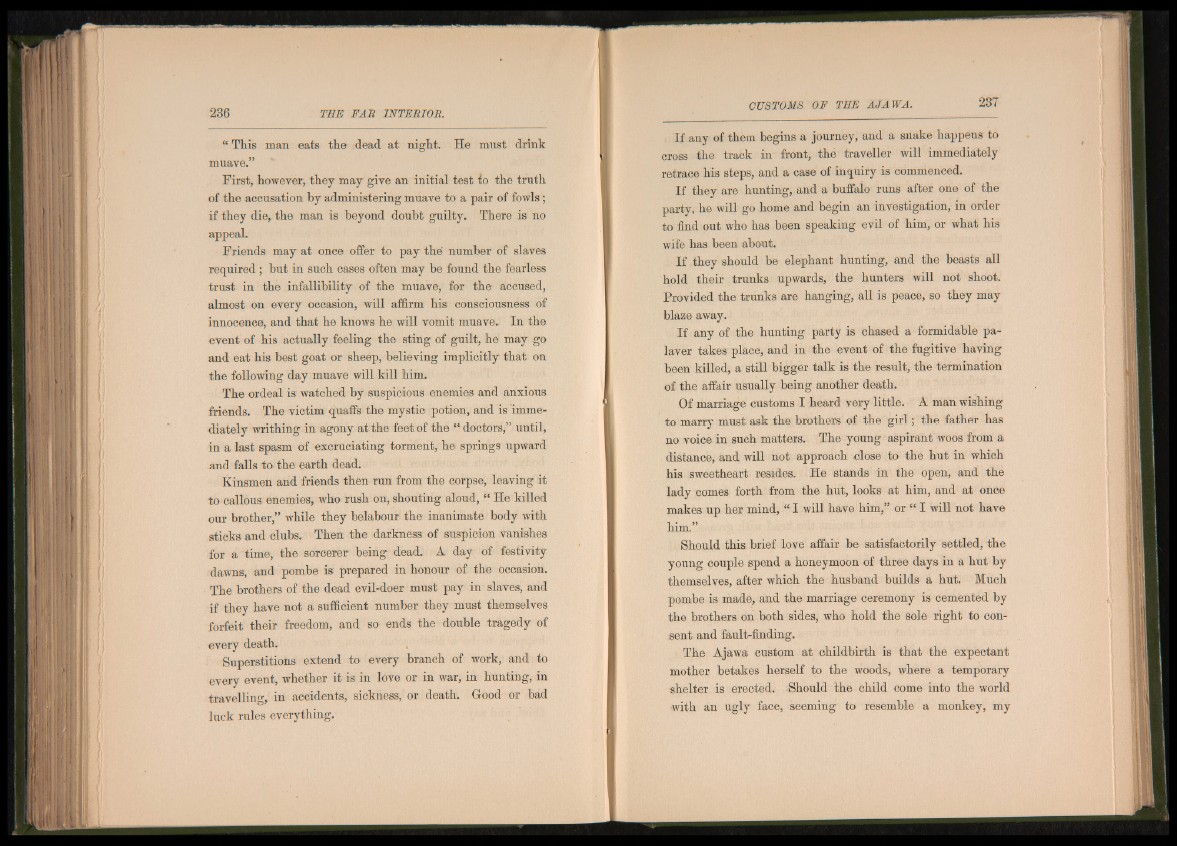
“ This man eats the dead at night. He must drink
muave.”
First, however, they may give an initial test to the truth
of the accusation by administering muave to a pair of fowls ;
if they die, the man is beyond doubt guilty. There is no
appeal.
Friends may at once offer to pay the number of slaves
required ; but in such cases often may be found the fearless
trust in the infallibility of the muave, for th e accused,
almost on every occasion, will affirm his consciousness of
innocence, and that he knows he will vomit muave. In the
event of his actually feeling the sting of guilt, he may go
and eat his best goat or sheep, believing implicitly that on
the following day muave will kill him.
The ordeal is watched by suspicious enemies and anxious
friends. The victim quaffs the mystic potion, and is immediately
writhing in agony at the feet of the “ doctors,” until,
in a last spasm of excruciating torment, he springs upward
and falls to the earth dead.
Kinsmen and friends then run from the corpse, leaving it
to callous enemies, who rush on, shouting aloud, “ He killed
our brother,” while they belabour the inanimate body with
sticks and clubs. Then the darkness of suspicion vanishes
for a time, the sorcerer being dead. A day of festivity
dawns, and pombe is prepared in honour of the occasion.
The brothers of the dead evil-doer must pay in slaves, and
if they have not a sufficient number they must themselves
forfeit their freedom, and so ends the double tragedy of
every death.
Superstitions extend to every branch of work, and to
every event, whether it is in love or in war, in hunting, in
travelling, in accidents, sickness, or death. Gtood or bad
luck rules everything.
If any of them begins a journey, and a snake happens to
cross the track in front, the traveller will immediately
retrace his steps, and a case of inquiry is commenced.
If they are hunting, and a buffalo runs after one of the
party, he will go home and begin an investigation, in order
to find out who has been speaking evil of him, or what his
wife has been about.
If they should be elephant hunting, and the beasts all
hold their trunks upwards, the hunters will not shoot.
Provided the trunks are hanging, all is peace, so they may
blaze away.
If any of the hunting party is chased a formidable palaver
takes place, and in the event of the fugitive having
been killed, a still bigger talk is the result, the termination
of the affair usually being another death.
Of marriage customs I heard very little. A man wishing
to marry must ask the brothers of the g ir l; the father has
no voice in such matters. The young aspirant woos from a
distance, and will not approach close to the hut in which
his sweetheart resides. He stands in the open, and the
lady comes forth from the hut, looks at him, and at once
makes up her mind, “ I will have him,” or “ I will not have
him.”
Should this brief love affair be satisfactorily settled, the
young couple spend a honeymoon of three days in a hut by
themselves, after which the husband builds a hut. Much
pombe is made, and the marriage ceremony is cemented by
the brothers on both sides, who hold the sole right to consent
and fault-finding.
The Ajawa custom at childbirth is that the expectant
mother betakes herself to the woods, where a temporary
shelter is erected. Should the child come into the world
with an ugly face, seeming to resemble a monkey, my